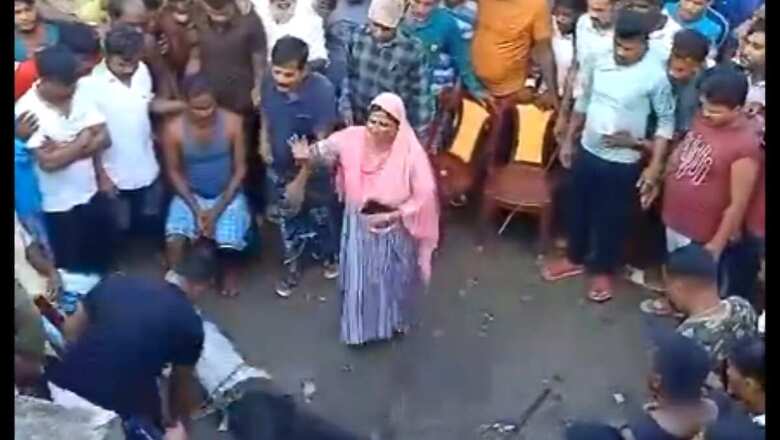
views
The recent incident of mob violence in Chopra, West Bengal, starkly highlights the troubling intersection of vigilante justice, local strongmen, and political manoeuvring. The public flogging of a woman, captured in a chilling video, has ignited not only outrage but also a political firestorm, with the ruling Trinamool Congress (TMC) and Opposition parties trading accusations of culpability and moral bankruptcy.
Central to this controversy is the figure of Tajemul Islam, known as JCB, a local strongman with alleged political connections, who is accused of dispensing his own brand of ‘insaf’ or justice. This incident is part of a broader pattern of rising vigilante justice in India. Such acts often stem from the failure of institutional mechanisms, setting a dangerous precedent where mobs, not the law, serve justice.
The political ramifications of such incidents are profound. The TMC, under Chief Minister Mamata Banerjee, which has made substantial electoral gains, now finds itself in a precarious position navigating the fallout from the Chopra incident. The party’s response, contrasting its zero-tolerance policy against such acts with the alleged inaction of BJP-ruled states, reflects the complex dynamics at play. Meanwhile, the Opposition has capitalised on this opportunity, branding the state as being under “Taliban rule” and holding the TMC accountable for the deteriorating law and order situation.
Local strongmen like Tajemul have long been fixtures in West Bengal’s political landscape, often used by parties to consolidate votes while wielding significant influence over local affairs. However, the TMC’s recent electoral success has been tarnished by incidents like Chopra, raising questions about the party’s ability to control such elements and the impact on its political reputation. In conclusion, the Chopra mob violence incident is a confluence of systemic failures, political expediency, and the unchecked power of local strongmen. It underscores the urgent need for political parties to intervene and for the state machinery to restore faith in the rule of law.
As West Bengal grapples with the implications of this incident, it is imperative that justice and order prevail over the whims of vigilante justice and political gains.
Strongmen Rule
The political landscape of West Bengal is dominated by strongmen who wield significant influence and often operate outside conventional politics. Mamata Banerjee’s TMC has embraced this culture, absorbing former Left-aligned strongmen and nurturing new power players. These individuals, like Tajemul Islam, Sheikh Shahjahan, and Anubrata Mondal, are both assets and liabilities, commanding local support and mobilising the electorate.
While they deliver swift justice and consolidate the party’s position, their methods raise serious law and order concerns. Tajemul’s reputation for meting out vigilante justice, Sheikh Shahjahan’s rise from humble beginnings to significant clout at Sandeshkhali, and Anubrata Mondal’s controversial remarks and alleged involvement in illegal activities all highlight the TMC’s reliance on strongmen.
This culture may ensure short-term political survival, but it undermines the party’s image and West Bengal’s democratic fabric. The TMC’s dependence on strongmen poses significant challenges, leading to governance issues, internal power struggles, and questions about the party’s commitment to democracy and the rule of law. As the party navigates the complexities of electoral politics, it must consider a path that prioritises democratic principles and the well-being of all citizens, not just a select few.
Rising Incidents of Vigilante Justice and Sexual Violence
The increase in mob violence and violence against women in West Bengal has been a topic of significant concern and debate. The recent events in Sandeshkhali, where local women accused TMC leaders of sexual exploitation and land grabbing, have highlighted the severity of the issue.
One of the most alarming incidents involved the public flogging of a woman, which has sparked widespread outrage. This incident is symptomatic of a broader pattern of vigilante justice that has been rising in the state. Local strongmen, often with alleged political connections, have been accused of dispensing their own version of justice, leading to severe human rights violations. For instance, Shajahan Sheikh, a TMC leader, has been at the centre of allegations involving land grabbing and sexual violence against women in Sandeshkhali.
The political implications of such incidents are significant. The Opposition Bharatiya Janata Party (BJP) has accused Mamata Banerjee of being a “mute spectator” to the violence, alleging that her government provides protection to party goons involved in such acts. The BJP has demanded her resignation, pointing to the deteriorating law and order situation as evidence of her government’s failure to protect women and curb mob violence.
Moreover, the National Human Rights Commission (NHRC) has issued notices to the West Bengal government regarding the violence in Sandeshkhali. The NHRC’s involvement indicates a lack of confidence in the local authorities’ ability to manage and rectify the situation.
These incidents reflect a troubling trend where local political dynamics and the influence of strongmen undermine the rule of law, leading to increased instances of violence against women and mob justice.
TMC’s Reluctance
The TMC’s complicity in this violence is evident in the party’s reluctance to take action against its own leaders and workers accused of perpetrating such crimes. The infamous Park Street rape case, where a TMC MLA was accused of raping a woman, is a stark reminder of the party’s duplicity on women’s safety.
Mamata Banerjee’s government has failed to address these issues, choosing to silence critics instead and intimidate the media into not reporting such incidents. The state’s law and order machinery lies in shambles, with the police often colluding with criminals or turning a blind eye to their activities.
The people of Bengal deserve better. They deserve a government that prioritises their safety and well-being over political expediency. It’s time for Mamata Banerjee to take responsibility for her government’s failures and ensure that the state is restored to its former glory, where the rule of law prevails and citizens feel safe and protected.
Appeasement Politics
The political narrative in Bengal has been increasingly marred by a series of violent incidents, with post-poll violence highlighting the state’s volatile political climate. TMC is at the centre of this turmoil, accused of fostering a culture of appeasement politics, which critics argue contributes to the state’s unrest. Banerjee’s political strategy has often been scrutinised for its alleged minority appeasement, aimed at consolidating the Muslim vote bank, which constitutes about 30 per cent of the state’s population.
Her recent remarks against Hindu monks, perceived to be aligned with the BJP, underscore her efforts to distance her party from these religious figures. Such divisive tactics are said to exacerbate communal tensions, undermining the secular ethos historically characteristic of West Bengal’s politics.
The repercussions of such politics are evident in the aftermath of elections, where the TMC’s victory has been overshadowed by reports of violence against political opponents, particularly those affiliated with the BJP. The Calcutta High Court’s intervention, demanding an immediate end to the post-poll violence, underscores the severity of the situation and the state’s obligation to protect its citizens.
Critics argue that the TMC’s reliance on appeasement politics has not only polarised the electorate but also emboldened certain factions within the party to engage in acts of violence with impunity. The Sandeshkhali incident, where BJP workers were targeted, exemplifies the deep-seated political rivalries often fuelled by the party’s divisive rhetoric.
In conclusion, while the TMC under Mamata Banerjee has made significant electoral gains, the shadow of appeasement politics looms large over the state’s peace and harmony. The rampant violence and post-poll chaos serve as stark reminders that the politics of division can have far-reaching consequences, threatening the very fabric of society. It is imperative for the leadership to steer away from such tactics and foster an inclusive political environment that prioritises the welfare of all citizens over narrow electoral gains.
The author, a columnist and research scholar, teaches journalism at St. Xavier’s College (autonomous), Kolkata. He tweets at @sayantan_gh. Views expressed in the above piece are personal and solely those of the author. They do not necessarily reflect News18’s views.




















Comments
0 comment